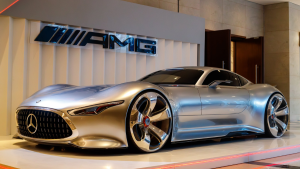Solid-state batteries: Mercedes-Benz teams up with Factorial Energy
On its way towards a fully electric future, Mercedes-Benz is joining forces with Factorial to jointly develop next-generation battery technology with the aim of testing prototype cells as early as next year. The goal of the partnership is to start with the cell and extend development to include entire modules and integration into the vehicle battery.
"By accelerating our Mercedes-Benz strategy towards 'Electric Only', we have set the course for a fully electric future. We will also play a leading role in the field of battery technology. With Factorial as our new partner, we are taking research and development in the field of promising solid-state batteries to the next level. To this end, we are investing a high double-digit million dollar amount in Factorial", said Markus Schäfer, Member of the Board of Management of Daimler AG and Mercedes-Benz AG; responsible for Daimler Group Research and Mercedes-Benz Cars COO. "With this cooperation, we combine Mercedes-Benz's expertise in battery development and vehicle integration with the comprehensive know-how of our partner Factorial in the field of solid-state batteries. We share the common vision of CO2 neutrality. The continuous development of innovative battery technologies will make electric mobility even more attractive for our customers."
Mercedes-Benz aims to integrate the technology into a limited number of vehicles as part of a small series within the next five years. With its investment, Mercedes-Benz obtains the right to delegate a representative to Factorial's Board of Directors.
"For Factorial Energy, it is a privilege to collaborate with Mercedes-Benz, which basically invented the automobile," said Siyu Huang, Co-founder and CEO of Factorial. "We look forward to working with them to further innovate the automobile with our clean, efficient and safe solid-state battery technology."
The technology
Solid-state batteries are currently one of the most promising technologies in the field of electric mobility. The decisive difference is the use of an electrolyte made of solid material instead of the commonly used liquid electrolyte. The electrolyte is needed to transport ions back and forth between the electrodes when charging and discharging the battery. Solid electrolytes enable a significantly optimized safety of the battery as well as the use of new types of anodes, such as lithium-metal anodes. These offer an almost doubled energy density compared to today's Li-ion battery cells. As a result, they promise an increase in range while at the same time ensuring short charging times.
DISCLAIMER: This information is published as per the press release sent to us. It has not been verified or ratified by OVERDRIVE.











